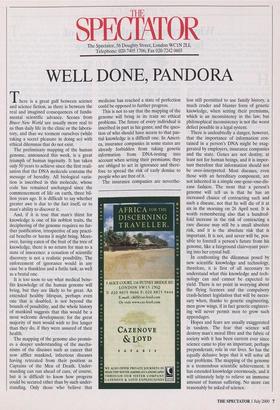SPECTATOR
The Spectator, 56 Doughty Street, London WC1N 2LL Telephone: 020-7405 1706; Fax 020-7242 0603
WELL DONE, PANDORA
There is a great gulf between science and science fiction, as there is between the real and imagined consequences of funda- mental scientific advance. Scenes from Brave New World are usually more real to us than daily life in the clinic or the labora- tory, and thus we torment ourselves (while taking a secret pleasure in doing so) with ethical dilemmas that do not exist.
The preliminary mapping of the human genome, announced this week, is a great triumph of human ingenuity. It has taken only 50 years to achieve since the first reali- sation that the DNA molecule contains the message of heredity. All biological varia- tion is inscribed in this molecule, whose code has remained unchanged since the commencement of life on earth, three bil- lion years ago. It is difficult to say whether greater awe is due to the fact itself, or to man's ability to discover it.
And, if it is true that man's thirst for knowledge is one of his noblest traits, the deciphering of the genome requires no fur- ther justification, irrespective of any practi- cal benefits or harms it might bring. More- over, having eaten of the fruit of the tree of knowledge, there is no return for man to a state of innocence: a cessation of scientific discovery is not a realistic possibility. The enforcement of ignorance would in any case be a thankless and a futile task, as well as a brutal one.
It is too soon to say what medical bene- fits knowledge of the human genome will bring, but they are likely to be great. An extended healthy lifespan, perhaps even one that is doubled, is not beyond the bounds of possibility, and the whole history of mankind suggests that this would be a most welcome development; for the great majority of men would wish to live longer than they do, if they were assured of their health.
The mapping of the genome also promis- es a deeper understanding of the mecha- nisms of the diseases such as cancer that now afflict mankind, infectious diseases having retreated from their position as Captains of the Men of Death. Under- standing can run ahead of cure, of course, but it is difficult to know how progress could be secured other than by such under- standing. Only those who believe that medicine has reached a state of perfection could be opposed to further progress.
This is not to say that the mapping of the genome will bring in its train no ethical problems. The future of every individual is inscribed in part in his genes; and the ques- tion of who should have access to that par- tial knowledge is a difficult one. In Ameri- ca, insurance companies in some states are already forbidden from taking genetic information from DNA-testing into account when setting their premiums; they are obliged to act in ignorance and there- fore to spread the risk of early demise to people who are free of it. The insurance companies are neverthe- less still permitted to use family history, a much cruder and blunter form of genetic knowledge, when setting their premiums, which is an inconsistency in the law; but philosophical inconsistency is not the worst defect possible in a legal system.
There is undoubtedly a danger, however, that the importance of information con- tained in a person's DNA might be exag- gerated by employers, insurance companies and the state. Genes are not destiny, at least not for human beings, and it is impor- tant therefore that information should not be over-interpreted. Most diseases, even those with an hereditary component, are not inherited in a simple one-gene—one-dis- ease fashion. The most that a person's genome will tell us is that he has an increased chance of contracting such and such a disease, not that he will die of it at six in the morning on 26 April next. It is worth remembering also that a hundred- fold increase in the risk of contracting a rare disease may still be a small absolute risk, and it is the absolute risk that is important. It is not, and never will be, pos- sible to foretell a person's future from his genome, like a fairground clairvoyant peer- ing into her crystal ball.
In confronting the dilemmas posed by new scientific knowledge and technology, therefore, it is first of all necessary to understand what this knowledge and tech- nology can and cannot be expected to yield. There is no point in worrying about the flying licences and the compulsory crash-helmet legislation that will be neces- sary when, thanks to genetic engineering, men grow wings, if in fact genetic engineer- ing will never permit men to grow such appendages.
Hopes and fears are usually exaggerated in tandem. The fear that science will destroy man's moral fibre and the fabric of society with it has been current ever since science came to play an important, perhaps preponderant, role in our lives. So has the equally delusive hope that it will solve all our problems. The mapping of the genome is a tremendous scientific achievement, it has extended knowledge enormously, and it will ultimately help to relieve an immense amount of human suffering. No more can reasonably be asked of science.


























































 Previous page
Previous page